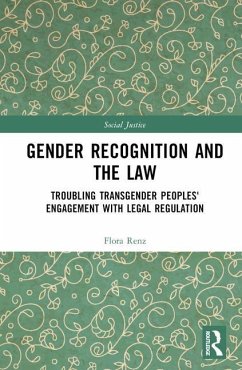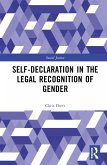Analysing the strategies people use to resist, accept and respond to laws that attempt to shape not just their behaviour, but also their identity, this book pursues a critical engagement with legal gender transition.
The Gender Recognition Act (GRA) has often been described as a groundbreaking and progressive legal framework for allowing people to legally change their gender. This book seeks to challenge this representation by drawing on in-depth qualitative interviews with trans people about the GRA. Theoretically this book uses the concepts of legal consciousness, agency and emotion to highlight the normative underpinnings of the GRA. Overall, the book contends, the GRA does not accurately reflect many trans people's own understanding of their gender identity or their sexuality. It is designed to create subjects that govern their behaviour and self-expression in a way that aligns with a purely binary model of sex/gender and sexuality. Although a deviation from thesenorms does not incur any direct punishment, it indirectly leads to a denial of rights and legal protections. By reviewing relevant legislation and case law, and through qualitative research, the book establishes how, instead of uncritically accepting or completely rejecting the GRA, trans people enact their singular identities by engaging strategically with law.
This book will be of interest across a range of disciplines, including socio-legal studies, family law, gender, sexuality and law as well as sociology courses on gender, identity and social policy.
The Gender Recognition Act (GRA) has often been described as a groundbreaking and progressive legal framework for allowing people to legally change their gender. This book seeks to challenge this representation by drawing on in-depth qualitative interviews with trans people about the GRA. Theoretically this book uses the concepts of legal consciousness, agency and emotion to highlight the normative underpinnings of the GRA. Overall, the book contends, the GRA does not accurately reflect many trans people's own understanding of their gender identity or their sexuality. It is designed to create subjects that govern their behaviour and self-expression in a way that aligns with a purely binary model of sex/gender and sexuality. Although a deviation from thesenorms does not incur any direct punishment, it indirectly leads to a denial of rights and legal protections. By reviewing relevant legislation and case law, and through qualitative research, the book establishes how, instead of uncritically accepting or completely rejecting the GRA, trans people enact their singular identities by engaging strategically with law.
This book will be of interest across a range of disciplines, including socio-legal studies, family law, gender, sexuality and law as well as sociology courses on gender, identity and social policy.
"Renz's book is an important contribution in this moment for bringing us back to the legislation and how it practically impacts the people whom it was designed to help. Forme, this is first and foremostwhy this book is important. Nonetheless, it also makes important theoretical contributions, perhaps most persuasively in relation to legal consciousness but also to agency and emotion. Any scholarship engaging with these ideas will also find in Renz's book an important and stimulating contribution." Chris Ashford, Northumbria Law School, Northumbria University, UK.








